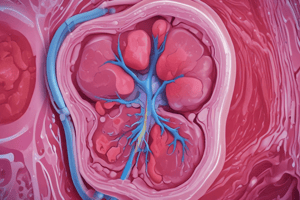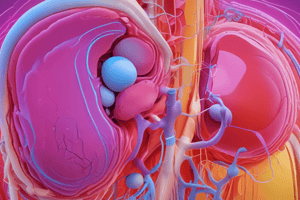Podcast
Questions and Answers
What is hydronephrosis?
What is hydronephrosis?
- A type of kidney stone
- A condition where the kidneys swell due to the accumulation of urine (correct)
- A type of urinary tract infection
- A condition where the kidneys shrink due to a lack of urine
What is a common cause of hydronephrosis?
What is a common cause of hydronephrosis?
- Diabetes
- Kidney stones (correct)
- High blood pressure
- Asthma
What is a symptom of hydronephrosis?
What is a symptom of hydronephrosis?
- Severe pain on one or both sides of the lower back (correct)
- Headache
- Itching
- Fatigue
What is a diagnosis method for hydronephrosis?
What is a diagnosis method for hydronephrosis?
What is a treatment option for hydronephrosis?
What is a treatment option for hydronephrosis?
What is a complication of hydronephrosis?
What is a complication of hydronephrosis?
Flashcards are hidden until you start studying
Study Notes
Definition and Causes
- Hydronephrosis is a condition where the kidneys swell due to the accumulation of urine, causing a blockage in the urinary tract.
- Causes:
- Kidney stones
- Tumors
- Blood clots
- Injuries
- Birth defects
- Prostate enlargement (in men)
Symptoms
- Severe pain on one or both sides of the lower back
- Nausea and vomiting
- Frequent urination
- Painful urination
- Increased frequency of urination at night
- Fever (if accompanied by infection)
Diagnosis
- Imaging tests:
- Ultrasound
- CT scans
- MRI
- Urinalysis to check for blood, protein, or bacteria in the urine
- Physical examination to check for tenderness in the kidneys
Treatment
- Relieving the blockage:
- Surgery to remove kidney stones or tumors
- Stenting to open up the blocked ureter
- Managing symptoms:
- Pain relief medication
- Antibiotics for infections
- In severe cases, temporary or permanent urinary diversion may be necessary
Complications
- Chronic kidney disease
- Kidney failure
- Sepsis (if infection spreads to the bloodstream)
- Permanent kidney damage
Prevention
- Drinking plenty of water to prevent kidney stone formation
- Maintaining a healthy diet and weight
- Avoiding certain medications that can harm the kidneys
- Managing underlying medical conditions, such as diabetes and high blood pressure
Definition and Causes of Hydronephrosis
- Hydronephrosis occurs when kidneys swell due to urine accumulation, causing a urinary tract blockage.
- Causes include kidney stones, tumors, blood clots, injuries, birth defects, and prostate enlargement in men.
Symptoms of Hydronephrosis
- Severe pain on one or both sides of the lower back.
- Nausea and vomiting.
- Frequent urination, painful urination, and increased nighttime urination.
- Fever may occur if accompanied by infection.
Diagnosis of Hydronephrosis
- Imaging tests: ultrasound, CT scans, and MRI.
- Urinalysis to check for blood, protein, or bacteria in the urine.
- Physical examination to check for kidney tenderness.
Treatment of Hydronephrosis
- Relieving blockages through surgery to remove kidney stones or tumors, or stenting to open up blocked ureters.
- Managing symptoms with pain relief medication and antibiotics for infections.
- In severe cases, temporary or permanent urinary diversion may be necessary.
Complications of Hydronephrosis
- Chronic kidney disease.
- Kidney failure.
- Sepsis if infection spreads to the bloodstream.
- Permanent kidney damage.
Prevention of Hydronephrosis
- Drinking plenty of water to prevent kidney stone formation.
- Maintaining a healthy diet and weight.
- Avoiding certain medications that can harm the kidneys.
- Managing underlying medical conditions, such as diabetes and high blood pressure.
Studying That Suits You
Use AI to generate personalized quizzes and flashcards to suit your learning preferences.




